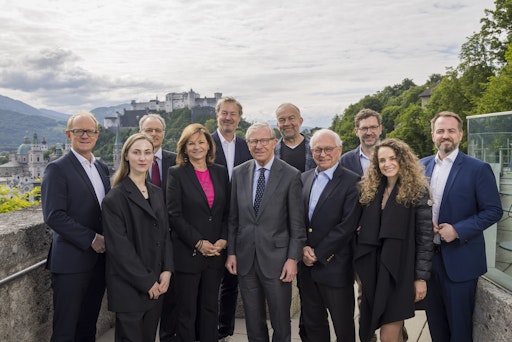How will artificial intelligence shape the infrastructure of the future? Which specific fields of action are there for energy suppliers? The first Mönchsbergforum of Salzburg AG provides answers: In three sessions, an expert: Interior Council Central Future Theses-and made the Mönchsbergforum of Salzburg AG a real “do tank”. “The results and derivations will flow into the strategy process of Salzburg AG and we will formulate concrete projects and goals from it,” say the board members of Salzburg AG, Michael Baminger and Herwig Struber.
On May 15 and 16, 2025, the three sessions of the Mönchsbergforum on the subject of “AI and Infrastructure” took place. The highlight was the open forum with 120 interested parties from science, business and politics on Thursday evening in the Karl-Böhm hall with keynote speaker Prof. Jürgen Schmidhuber. His message: “Europe has to catch up with the AI infrastructure in global competition-and regional players such as Salzburg AG have to be strategic pioneers,” said Schmidhuber. As a result of the intensive work sessions, five central future theses emerged:
The five core theses at an overview:
1. AI as a transformation driver for the energy industry
The use of artificial intelligence is no longer a future scenario, but an indispensable tool for efficiency in energy generation, distribution, use, use and in particular an improvement in the customer experience. “AI enables adaptive power grids, more efficient traffic control, optimized logistics and smart building and network monitoring- core areas of Salzburg AG.”
2. Revolution of the understanding of infrastructure
“Building on data, computer capacity and energy, AI becomes the driving force behind the digital infrastructure of the future,” is the second central thesis. Big-Tech companies are expanding to expand the energy component. It is obvious that energy suppliers also think about an expansion of the spectrum. This creates new challenges as well as opportunities, for example as a provider of computing power for users who need local, stable and sustainable alternatives.
3. Sustainability in the area of tension of the energy requirement
A central finding of the forum: “The Sustainability Potential of AI are in a tension on their energy and water requirements.” On the one hand, AI can massively accelerate the integration of renewable energies and push the energy transition forward. On the other hand, AI systems themselves need considerable computing power and thus electricity, preferably from renewable energy sources. Sustainable AI use therefore requires green data centers and a critical assessment of the actual benefit.
4. Cultural change as a success factor
“The use of AI requires a new culture of learning and a change process in the company,” is another key thesis. AI integration is not a purely technical project-it changes processes, roles and responsibilities. Companies must promote a culture in which continuous learning and the constructive handling of new technology are a matter of course. This is the only way to not only serve the technology, but also actively help shape it.
5. Resilient infrastructure as a location factor
The global perspective shows the dependency on AI infrastructure, in this context resilience is a regional location factor for Salzburg AG.
Interdisciplinary exchange of experts: inside
The Mönchsbergforum is pursuing a clear 360-degree approach: In an exclusive framework, it brings leading heads of different disciplines together to jointly develop solutions for the most pressing questions of our time. The content of the content is in the hands of Univ.-Prof. Dr. Meinhard Lukas, the long -time rector of the Johannes Kepler University in Linz and internationally recognized scientists and experts.
The expert: Interior Council, consisting of GDR. Stefan Thurner (Professor of Science of Complex Systems at the Medical University of Vienna), Prof. Dr. HC Wolfgang Ischinger (President of the Foundation Council of the Münchner Security Conference (MSC)), Dr. Angelika Reich (Managing Director at Avancell Joint), Victoria Neuhofer (founder and CEO of Damn Plastic), Dr. Susanne Riess-Hahn (CEO of Bausparkasse Wüstenrot AG), Univ. Prof. Mag. Dr. Günter Klambauer (scientist in the field of artificial intelligence at the Johannes Kepler University Linz) and Andreas Arntzen (CEO of the Word & Bild Verlagsgruppe) ensured the interdisciplinary perspective when developing the theses. In three intensive workshops, the central findings on AI and infrastructure were systematically developed and compressed into action -oriented future theses.
From theory to practice: the “do tank approach”
“Transformation is not a keyword for us, we want to implement,” emphasized Baminger in his opening speech. The Salzburg Governor Dr. Wilfried Haslauer underlined the regional importance: “At a time of fundamental change, regional alliances are indispensable. We need networks that dissolve the boundaries between disciplines and courageously set new ground.”
As an immediate sequel, Michael Baminger, Herwig Struber and Meinhard Lukas announced a workshop by the management team in Salzburg AG, in which the theses developed and impulses from the Mönchsbergforum are translated into concrete implementation strategies and measures. “We do not want to make the knowledge gained disappear in the drawer, but actively integrate into our corporate strategy,” explains Baminger. “With this do tank approach, we create a direct bridge between visionary thinking and concrete action.”
